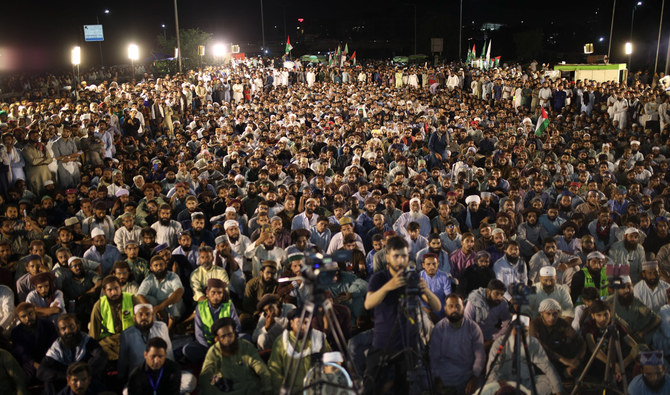ISLAMABAD: A Pakistani religious party on Thursday vowed to continue its large pro-Palestine sit-in protest at a key junction connecting the twin cities of Islamabad and Rawalpindi until its demands are not met, as residents suffer traffic disruption.
Tehreek-e-Labbaik Pakistan (TLP), known for its hard-line stance on blasphemy laws, has previously staged sit-ins at the Faizabad Interchange. The presence of large numbers of protesters in the area significantly disrupts traffic, forcing drivers to take longer, alternative routes between the two cities.
The TLP workers, led by their young leader Saad Rizvi, took out a protest rally from Liaquat Bagh in Rawalpindi to Faizabad last Saturday before deciding to set up a protest camp at the interchange.
The TLP has asked the government to officially boycott Israeli products and send food and medical aid to Palestinians suffering Israel’s relentless military campaign in Gaza. They have also called on Pakistan’s government to declare Israeli Prime Minister Benjamin Netanyahu a “terrorist.”
“We are engaged with the government regarding our demands for the people of Palestine but no agreement has been reached yet,” Sajjad Saifi, a member of the TLP’s Shoura or consultative council, told Arab News over the phone.
“We will continue our dharna [sit-in] till all three of our demands are fully met.”
Saifi said TLP chief Rizvi was leading the party’s protest, adding that over 50,000 of their supporters were camped at the Faizabad Interchange.
“If the government accepts our demands, it will earn a huge respect in the Muslim world,” he said.
Israel’s war on Gaza has so far claimed at least 39,000 lives, many of them women and children. The casualties have sparked anger and protests worldwide, including in Pakistan, where the country’s civil society and political factions have consistently led pro-Palestine rallies.
When asked why the party decided to stage a sit-in protest nine months into the war, Saifi said the TLP had mobilized the public since October last year through rallies across Pakistan.
“Tens of thousands of our supporters have been waiting for the leadership’s call to join the dharna in Islamabad,” he said.
“We are doing it for a cause, for the people of Palestine. We don’t have any political agenda to achieve through this dharna.”
The large number of protesters at the Faizabad Interchange have effectively blocked the Islamabad Expressway, causing difficulty for commuters and creating gridlocks in the area.
When asked about the protest and the inconvenience being caused to the public, Information Minister Attaullah Tara said:
“Don’t worry, we are on it.”
‘STATE HAS SURRENDERED’
Political analysts called on the government to initiate strict action against the outfit to disperse them from the interchange.
“Freedom of movement is a basic right of the public, therefore the government and the Supreme Court should take notice of the dharna and initiate measures to disperse the protesters,” political analyst Adnan Rehmat told Arab News.
“If the government fails to initiate action against the TLP, it clearly means the state has surrendered before the outfit that doesn’t believe in any law and the constitution.”
Political science professor Rasul Bakhsh Rais agreed.
“There is no rationale behind the TLP’s sit-in as Pakistan has already dispatched food and medicines to the people of Gaza,” Rais told Arab News. “It is unfortunate the government is silent over the mess and taking no steps to disperse them.”
Pakistani religious party vows to continue pro-Palestine sit-in protest until demands are met
https://arab.news/5syys
Pakistani religious party vows to continue pro-Palestine sit-in protest until demands are met

- Thousands of Tehreek-e-Labbaik Pakistan supporters remain camped at Faizabad Interchange connecting Islamabad, Rawalpindi since last week
- TLP protesters demand Pakistan government officially boycott Israeli products, send aid to Gaza and declare Israeli PM a “terrorist”
Pakistan abolishes electricity duty in bills to ensure tariff transparency

- The move aims to simplify the billing structure, make it easier for consumers to manage power costs
- It follows launch of a mobile app that allows power consumers to record, submit their meter readings
ISLAMABAD: Pakistan has abolished electricity duty in power bills from the month of July, the country’s energy ministry said on Monday, in a bid to ensure transparency in tariff.
Power Minister Awais Leghari had written letters to chief executives of all provinces and informed them about the decision to discontinue the collection of electricity duty, according to the ministry.
He said high electricity tariffs were already a challenge and the additional burden of various levies further complicated the billing structure, making it difficult for consumers to manage their power costs.
“As part of this initiative, the Power Division has decided to discontinue the collection of electricity duty through electricity bills starting from July 2025,” Leghari was quoted as saying.
“We request provincial governments to explore alternative mechanisms for collecting provincial levies and duties, rather than relying on electricity bills as a collection channel.”
He said the federal government was making structural reforms to reduce tariffs such as renegotiating contracts with Independent Power Producer (IPP) and lowering the Return on Equity (ROE) for government-owned power plants, according to the energy ministry statement.
Leghari sought support from the provincial chief ministers in removing the complexity arising from multiple charges, taxes and duties being collected through consumer bills.
“He expressed the confidence that this will not only make electricity bills more transparent and easier to comprehend but also ensure that consumers are paying only for the cost of electricity, rather than a mix of other charges,” the statement read.
Pakistan has aggressively pursued reforms in its energy sector recently, which has long struggled with financial strain due to circular debt, power theft and transmission losses. These problems have led to blackouts and high electricity costs throughout the country, especially during the summers when demand peaks.
On Sunday, Prime Minister Shehbaz Sharif launched a mobile application that allows power consumers to record and submit their meter readings themselves, with the government saying the initiative will lead to more transparency in the system and reduce overbilling.
Electricity bills are generated in Pakistan every month by readings obtained from power meters installed at homes and businesses. These readings show the number of electricity units consumed during a monthly cycle and are taken by meter readers employed by power companies.
Pakistani power consumers have frequently complained of overbilling and incorrect readings taken by meter readers.
“This app... is a revolutionary technological reform whose benefit will reach every consumer in every home,” Sharif said at the app’s launch.
Pakistan plans naval, air collaboration in unmanned systems to boost indigenous capabilities

- The development comes weeks after a four-day Pakistan-India military standoff, which saw a widescale use of drones by them
- Small-scale drone attacks can strike targets without risking defense personnel or provoking uncontrollable military escalation
ISLAMABAD: Pakistan’s naval and air forces will be undertaking a strategic collaboration to advance indigenous capabilities in unmanned warfare systems, the country’s military said on Monday, citing Pakistan Navy Chief Admiral Naveed Ashraf.
The development comes weeks after a four-day military standoff between Pakistan and India, in which the two countries traded fighter jet, missile, drone and artillery fire, leaving 70 people dead on both sides before a United States-brokered ceasefire on May 10.
The fighting in May marked the first time New Delhi and Islamabad utilized unmanned aerial vehicles (UAVs) at scale against each other, with defense analysts expecting increased use of UAVs by them in future as small-scale drone attacks can strike targets without risking personnel or provoking uncontrollable escalation.
During a visit to Pakistan Air Force’s (PAF) Air War College Institute in Karachi, Naval Chief Ashraf announced the initiation of more frequent, integrated joint operational exercises with PAF, aimed at further reinforcing synergy and interoperability between the two services.
“The Naval Chief also highlighted the transformative role of technological innovation in contemporary conflicts. Citing the growing significance of Unmanned Aerial Systems, he highlighted an upcoming strategic collaboration between the National Aerospace Science & Technology Park (NASTP) and Pakistan Maritime Science & Technology Park (PMSTP),” the Inter-Services Public Relations (ISPR), the military’s media wing, said in a statement.
“This partnership, he noted, will focus on advancing indigenous capabilities in unmanned systems, thereby bolstering Pakistan’s technological self-reliance and operational edge in the defense sector.”
The development comes as the two South Asian neighbors, which spent more than $96 billion on defense last year, appear to be locked in a drones arms race.
India plans to invest heavily in local industry and could spend as much as $470 million on UAVs over the next 12 to 24 months, roughly three times pre-conflict levels, Smit Shah of Drone Federation India, which represents over 550 companies and regularly interacts with the government, told Reuters last month.
The PAF, meanwhile, is pushing to acquire more UAVs as it seeks to avoid risking its high-end aircraft, Reuters quoted a Pakistani source familiar with the matter as saying.
Pakistan and India both deployed cutting-edge 4.5 generation fighter jets during the latest clashes but cash-strapped Islamabad only has about 20 high-end Chinese-made J-10 fighters compared to the three dozen Rafales that Delhi can muster.
Pakistan is likely to build on existing relationships to intensify collaboration with China and Turkiye to advance domestic drone research and production capabilities.
Speaking to participants of an air war course in Karachi, Admiral Ashraf underscored that operational preparedness remains the cornerstone of triumph in modern warfare.
“He referenced recent developments along the eastern front as a vivid illustration of the critical need for constant readiness and strategic foresight,” the ISPR said.
“Emphasizing the imperative of cohesive national defense, he stressed the importance of inter-services collaboration in achieving strategic objectives.”
India and Pakistan, bitter rivals since they gained independence in 1947 from British rule, have fought three wars, including two over the disputed Himalayan territory of Kashmir.
The latest crisis was also triggered by an attack in Indian-administered Kashmir, which New Delhi blamed on Pakistan-backed militants without offering any evidence. Islamabad denied the allegation.
Pakistan to consider extending deadline for Afghan refugees facing mass deportation

- Any extension approved by the government would be a relief for those previously ordered to return to Afghanistan by June 30
- In 2023, Pakistan had launched a controversial crackdown on foreigners it said were in the country illegally, mostly Afghans
PESHAWAR: Pakistan will consider extending the deadline for 1.4 million Afghan refugees living legally in the country to return home, officials said on Monday.
Any extension approved by the government would be a relief for those who were previously ordered to return to Afghanistan by June 30, according to government and security officials. A decision could come on Tuesday when the Cabinet is due to meet.
In 2023, Pakistan launched a controversial crackdown on foreigners it said were in the country illegally, mostly Afghans. Millions of Afghans have fled their homeland over the decades to escape war or poverty.
The officials — who spoke on condition of anonymity because they were not authorized to talk to the media on the record — said the proposed extension was to allow the refugees more time to settle their personal affairs in Pakistan, such as selling property or wrapping up business activities, before returning to Afghanistan in an orderly and dignified way.
A senior ministry official said the decision to submit the extension proposal was made last week. A summary regarding the fate of the Afghan refugees has been forwarded for inclusion in the Cabinet agenda.
The Interior Ministry, which has overseen the sweeping crackdown on Afghans, did not immediately comment.
There was no comment from the Foreign Affairs Ministry, which previously said it expected Afghan authorities to create “conducive conditions” so those returning were fully integrated into Afghan society.
Earlier this year, Pakistan said it wanted 3 million Afghans to leave the country, including 1.4 million people with Proof of Registration cards and some 800,000 with Afghan Citizen Cards. There are a further 1 million Afghans in the country illegally because they have no paperwork, according to officials.
They said Pakistan’s Ministry of States and Frontier Regions submitted a proposal to the federal government recommending a six-month extension for Afghans with Proof of Registration cards.
Pakistan’s expulsion campaign has drawn strong criticism from the UN and rights organizations.
Human Rights Watch has accused authorities of arbitrarily detaining and forcibly deporting Afghans, many of whom, they say, face harassment under the Taliban who seized power in Afghanistan in 2021.
On Saturday, the UN refugee agency said at least 1.2 million Afghans have been forced to return from Iran and Pakistan this year. It warned that repatriations on a massive scale have the potential to destabilize the fragile situation in Afghanistan.
Pakistani mango festival in Abu Dhabi promotes exports, celebrates Gulf demand

- Pakistan is world’s fourth-largest mango producer, Gulf countries receive 75% exports
- Festival in Abu Dhabi aims to promote trade while also strengthening Pakistan-UAE ties
ISLAMABAD: Pakistan’s embassy in the United Arab Emirates held a mango festival in Abu Dhabi to promote the country’s prized fruit exports, as demand for Pakistani mangoes continues to surge across the Gulf region, the mission said in a statement on Monday.
The “Pakistani Mango Festival 2025,” hosted at the Le Royal Meridien Hotel in partnership with the Overseas Pakistani Foundation on Sunday, drew a large gathering of Emirati dignitaries, diplomats, business leaders, and members of the Pakistani expatriate community, the embassy said in a statement.
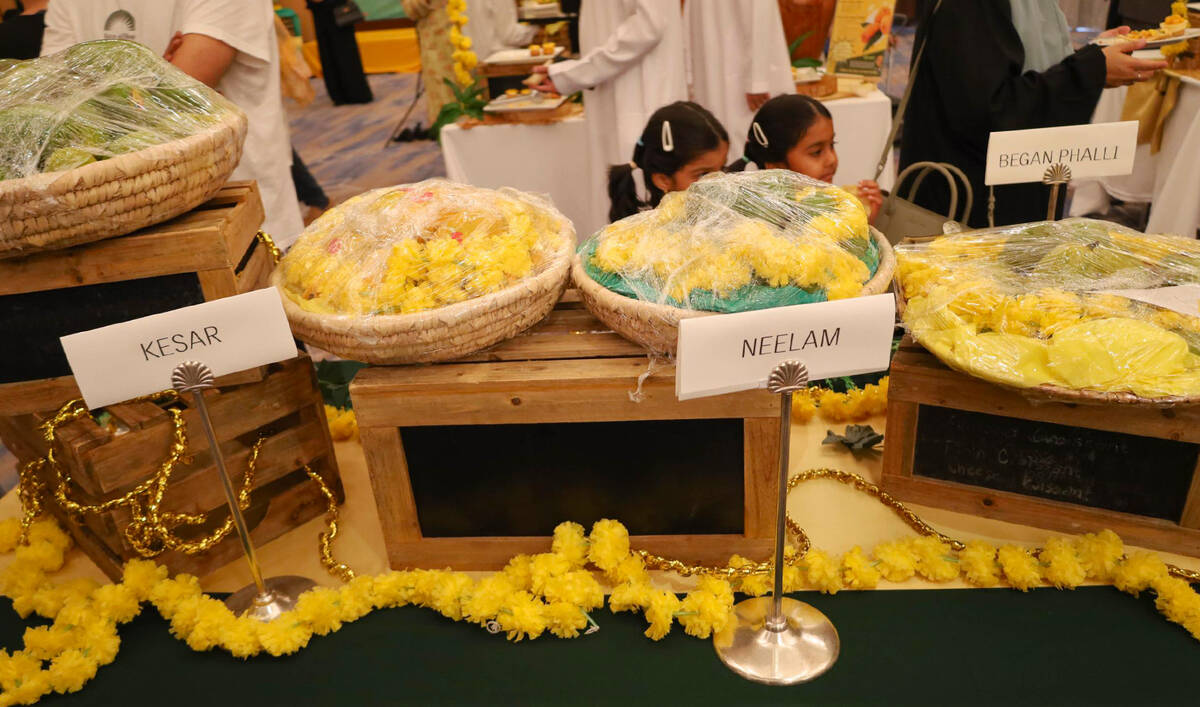
Pakistan is the world’s fourth-largest mango producer, according to the Trade Development Authority of Pakistan (TDAP), with an annual output of around 1.8 million tons. In 2023, the country exported over 125,000 tons of mangoes, generating nearly $100 million in revenue, official data shows.
Approximately 75% of Pakistan’s mango exports are shipped to the Gulf region.
“Festivals like the Mango Festival not only celebrate our agricultural excellence but also build bridges of understanding and friendship between the people of Pakistan and the UAE,” the statement said, quoting Pakistan’s Ambassador to the UAE, Faisal Niaz Tirmizi, as saying during the event.
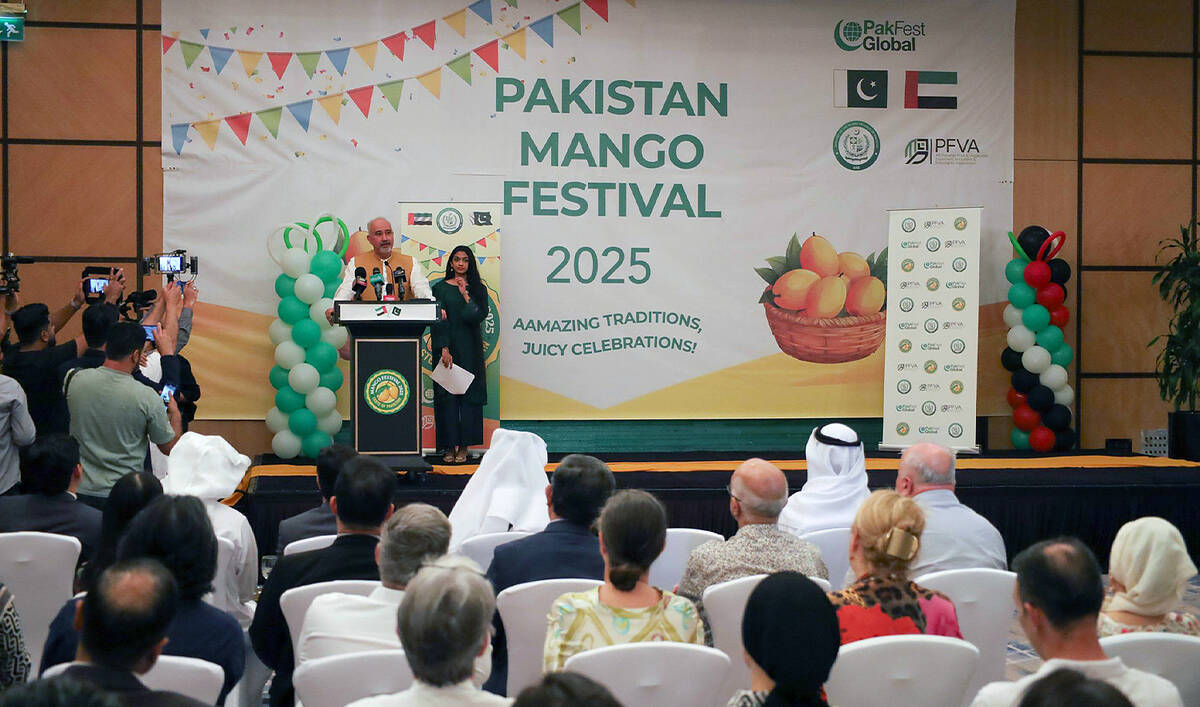
Popular varieties such as Sindhri, Chaunsa, Anwar Ratol, and Langra were on display and served at the festival, offering guests a taste of Pakistan’s agricultural richness.
The UAE is home to more than 1.7 million Pakistanis, one of the largest overseas communities, and serves as a key market and transit point for Pakistani agricultural exports to the broader Middle East.
Mango season in Pakistan typically runs from May to September, with exports peaking between June and August.
India-Pakistan conflict hits shared love of film, music

- India and Pakistan banned artists, YouTube channels from each other’s countries after their militaries fought in May
- While Bollywood movies have always been popular in Pakistan, Indians love music, drama serials produced by Pakistan
LAHORE: While conflict raged between the powerful militaries of India and Pakistan, a battle was also fought on the cultural front lines despite years of shared love for films and music.
The deadly fighting in early May — the worst in decades — affected artists previously untouched by animosity between their leaders.
Ali Gul Pir, a Pakistani rapper and comedian with a huge Indian following, released a song years ago mocking Indian Prime Minister Narendra Modi.
While he was spared consequences then, in May, his YouTube channel and Instagram profile were blocked in India.
“Indians now recognize that the digital space serves as a bridge between Pakistanis and Indians, and they seem intent on severing that connection,” Pir told AFP.
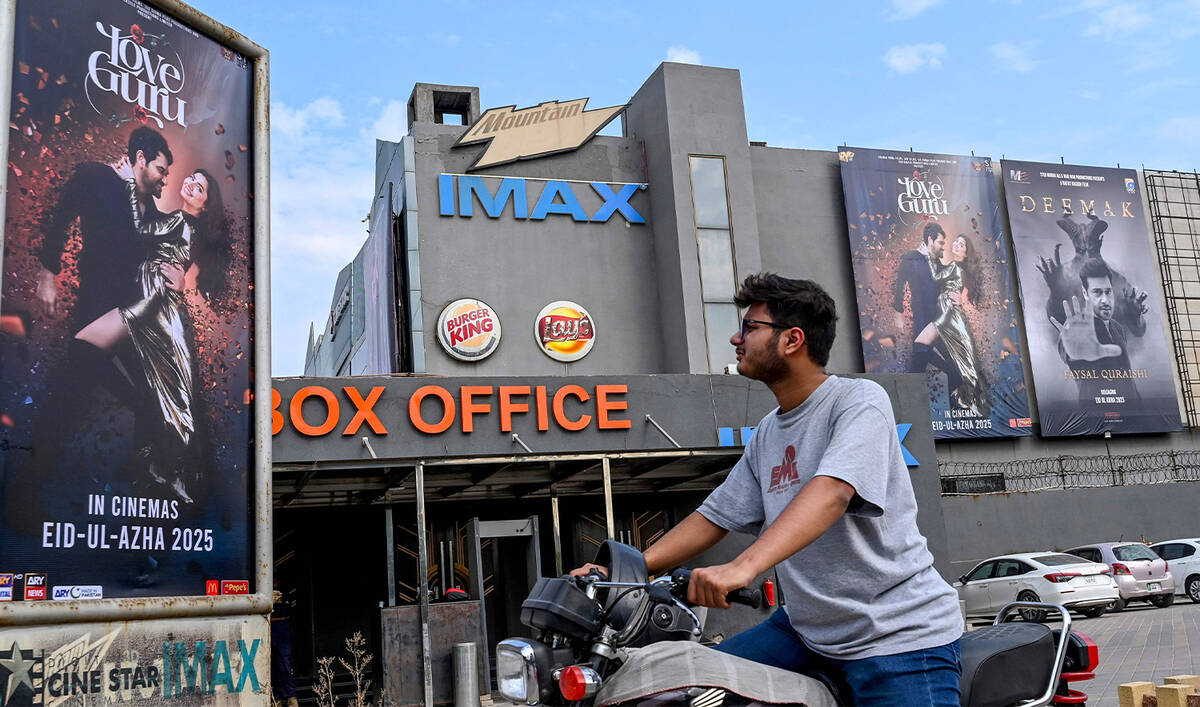
The collapse in bilateral relations was caused by a deadly April attack on tourists in India-administered Kashmir, which New Delhi blamed on Islamabad.
Pakistan denied the allegation and, after tit-for-tat diplomatic retaliation, their militaries fought for four days before a ceasefire was reached.
The conflict hit the music industry for the first time, with Pakistani singer Annural Khalid also remembering how her Indian following dropped off.
“Delhi was my top listening city before the ban,” said Khalid, who has 3.1 million monthly listeners on Spotify.
“I suffered a great loss in the audience” from India, she told AFP.
“Listeners were deprived of content because music was turned into something it is not,” Khalid added.

The conflict also scrubbed out some prior exchanges, such as the soundtrack of the 2017 film “Raees” on Spotify in India.
It now shows only Indian actor Shah Rukh Khan, without his Pakistani co-star Mahira Khan.
With Pakistan producing just a handful of movies each year under strict censorship rules, Bollywood has always proven popular among viewers.
“I grew up watching Bollywood. We have the same traumas, we have the same history, we have the same stories,” said Pakistani film critic Sajeer Shaikh.
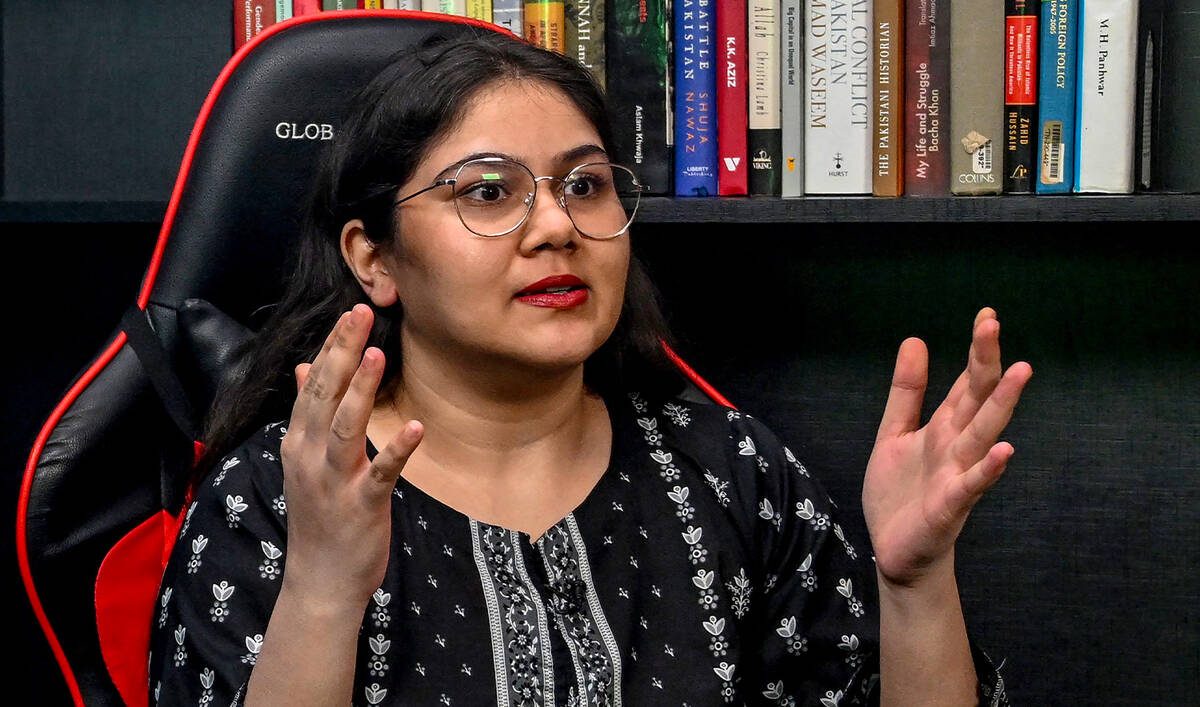
Pakistani actors and directors have for decades seen making it to Bollywood as the ultimate recognition.

But this month, Indian star Diljit Dosanjh announced his latest movie, “Sardaar Ji 3,” which features four Pakistani actors, would be released “overseas only,” after New Delhi banned Pakistani content and artists from productions.
“Abir Gulaal,” a love story starring Pakistan’s Fawad Khan and Indian actor Vaani Kapoor, was scheduled to hit Indian cinemas on May 9 but the release was postponed.
Even some in the industry who had previously backed the cross-border artistic trade changed their tune last month.
“Everything should be banned... cricket, films, everything,” said Indian actor Suniel Shetty, who has a big fan following in Pakistan.

He starred in the 2004 movie “Main Hoon Na,” which subtly promotes peace between India and Pakistan.
“It’s something really unfortunate about politics, creating that rift and putting boundaries around art,” said Dua Zahra, assistant manager at Warner Bros South Asia’s music label in Pakistan.
As part of its measures in the wake of the Kashmir attack, New Delhi’s ban on some Pakistani YouTube channels included private broadcaster HUM TV.
The channel, which says around 40 percent of its viewers are from India, simply told its fans to use a VPN to continue watching.
Since Modi took office more than a decade ago, many Indian critics and filmmakers have warned that Bollywood is now increasingly promoting his government’s Hindu nationalist ideology.
While the conflict has created divisions on the cultural scene, there are signs that the trade will endure.
Over a month after the ceasefire, three Indian films were in the top 10 on Netflix Pakistan, while the top 20 trending songs in India included two Pakistani tracks.
Pir, the rapper and comedian, vowed to “bridge gaps.”
“Let’s not make war, let’s just make art,” he said.
“Let’s just not bomb each other.”


